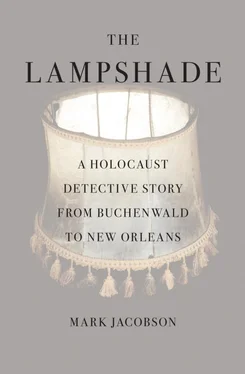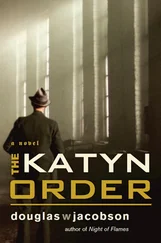“They say guys are buried in the walls,” Dominici said, recounting stories about panicked inmates who had supposedly tried to break through the walls to escape the stench-filled water and had gotten trapped. Dominici didn’t believe these wilder tales, but as he said, “they prey on your mind.”
Dominici pushed his head against the Plexiglas, let it rest there for half a minute or so before speaking again.
There were a lot of things he’d done in his life that could have been better, he finally said, confessionally. He could have been a better brother to Dani, to his other sister, Dawn, and to Ralph Jr. He could have been a better son to his mom; Patsy was “a saint.” He despaired over the times he’d made her bail him out, the time he wrecked his car on the railroad tracks, all the embarrassment he put her through. He could have been a better son to his father, too, or at least to his memory, even if his Pops had been a hard sort, the kind who’d give you a slap if you talked when Lawrence Welk was on the television.
It was the same with Gaynielle. She was his “soul mate,” they were made for each other, but there were times when he treated her poorly, when they didn’t allow themselves to express the love they felt for each other. Then there were his children. One of his daughters lived with Patsy. She was doing fine, too, had a good job, was going to college, going to make something of herself, yet when you mentioned her father, she narrowed her eyes and said, with equal parts disdain and regret, “Oh, my father. Let’s not talk about my father.”
That was his fault, Dominici said. No one else’s. He had been given great gifts throughout his life and had squandered every one.
And for what? Being a dope fiend. How could being a dope fiend be worth losing the love and trust of so many good people? So many times in who knew how many court-ordered treatment program meetings, Dominici had said he’d tried to “open his heart to Jesus Christ.” But even if he’d been an altar boy, the Jesus thing had never worked for him and it never would, at least not with the kind of Christ the priests tried to shove down your throat.
“It’s like I told you, from the beginning Albert Einstein made more sense to me than Holy Communion. Good luck with that in St. Bernard Parish! The fact is I’m not like the rest of these people. I got ideas. I told you about the Thermo-Squat, right?” Yes, Dominici had told me about the Thermo-Squat, his idea for a remote-controlled heating system for toilet seats. He’d told me more than once, but there was a special urgency to the sales pitch this time, as if a prewarmed toilet seat was the singular innovation upon which the continued spin of the planet depended.
“I’m not a bad person. I never did anything that hurt anybody. Not really. That’s why they shouldn’t have done to me what they did.”
We were close to the nub of it all now, the specter of the future that had increasingly come to haunt Dominici since being locked up with the ghosts of the OPP. It was part of his sentence in the cemetery bandit case, he claimed. He was barred from every cemetery in Orleans, Jefferson, or St. Bernard Parish.
“Dead or alive! I can’t set foot in a cemetery dead or alive. I can’t be buried in my home ground.”
This was the first I’d heard of it. If true, the sentence was breathtaking, both unmistakably appropriate and shockingly cruel, a punishment beyond day-to-day jurisprudence, almost tribal in nature.
It was the kind of retribution one might expect to find in a far-off place like the venerable Varanasi, the Indian city most loved by the world-destroying Shiva. Devout Hindus came to die in Varanasi, to have their bodies burned on massive woodpiles, the ashes flung into Mother Ganges. Piles of the dead, wrapped in gauze, were everywhere. Varanasi was municipality as death cult, but wasn’t that also true of New Orleans, another decaying former colonial metropolis set on the banks of a primal waterway. Dave Dominici had broken one of New Orleans’s inviolate taboos, had carelessly trampled, as dope fiends tend to do, upon sacred rules. So what other choice did the court have but to deny him the final splendor of earthly presence down here, the moment when the fellas yell, “Cut him loose!” and the band begins to play?
“That supposed to be fair?” Dominici wailed. “They don’t do that to murderers. They don’t do that to rapers. They’d only do it to someone like me. Someone from the other side of the tracks. A despised person like me.”
Dominici again rested his brow on the Plexiglas, as if the full weight of fate was upon him. Then, as if ejected from a crashing fighter plane, he jumped from his chair, straight up into the rank jail air.
“They don’t have the right! Throw me in here all you want, but no court has say over eternity. I’m from New Orleans. New Orleans is my home. I should be buried in New Orleans!”
A moment passed before Dominici said, “You know what’s going to happen to me? I’m going to be like that lampshade! Just like that fucking lampshade! All these years, since Hitler, and there’s no rest. From hand to hand. Wandering… The wandering Jew! No place to lay its head. That’s going to be me.”

TEN

It was a typical late summer afternoon at the intersection of Tulane and Broad, east of the OPP. Rain was beginning to fall, but vertically, always a relief during hurricane season. Since Katrina, the tempests had stayed away. Ernesto petered out over the Atlantic, Dean hit Mexico, but nothing big, nothing “named,” made it into the upper Gulf. The bit of moisture beating down today would quickly drain, leaving only soggy shoes and perhaps a couple more customers for the fungicide guys who put up the 888-MOLD signs on telephone poles in Treme and St. Roch, not that any of these treatments could be considered surefire. The problem was deeper than that.
In the middle of the last century, Tulane Avenue had been a decent sort of commercial thoroughfare, no Canal Street but a place to buy a couch and eat a reasonable bowl of gumbo at a restaurant with or without a tablecloth. The Katrina tide had been ten feet high here, and now, with the Times-Picayune running stories saying more than one-third of the residential structures in the city were uninhabited or “fatally blighted,” the avenue was half wasteland, with few cars and even fewer pedestrians. Many of the buildings were still boarded up, marked with fading “TFW” (Took Flood Water) National Guard marks. A spray-painted “U Steal, We Get Real” sign, barely visible, covered a piece of plywood nailed to the front of a former store that, in the idiosyncratic black southern tradition, had once doubled as an outlet for both tuxedo rentals and po’ boy sandwiches. The plywood was about all that was upright about the place; the remainder of the building had caved in behind it.
The only commercial establishments that could be said to be flourishing were bail bondsmen. There was the Free Me BailBond, the Abra-Ca-Da-Bra BailBond, the 1, 2, 3 Rollout Bailbond, and half a dozen more. This owed, of course, to the real business of Tulane and Broad, the meting out of justice at the massive Criminal Courts building that has dominated the intersection since it was built by Jim Crow labor in 1929.
Jurisprudence has often been a catch-as-catch-can thing at Tulane and Broad, no more so than since the end of the thirty-year reign of District Attorney Harry Connick Sr., father of the singer. Connick’s successor, Eddie Jordan, the first African American to be elected Orleans Parish DA, was on the verge of resignation. Known as “the Hat” thanks to his affectation of wearing an expensive derby, Jordan had just lost a $3.7 million civil action filed by several former DA office employees who claimed he’d systematically fired them for no other reason than that they were white. Of the fifty-six white employees fired, all but one was replaced with a worker of color, the suit charged. Claiming he was only trying to do “what was best for the city,” the Hat denied that his actions were motivated by race.
Читать дальше













